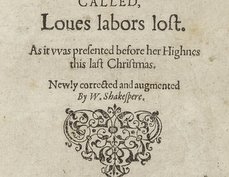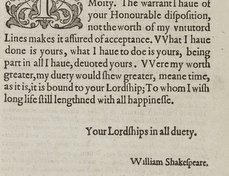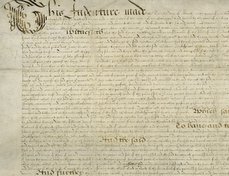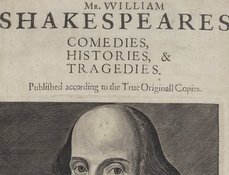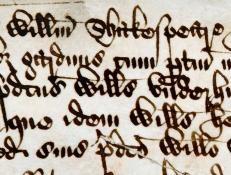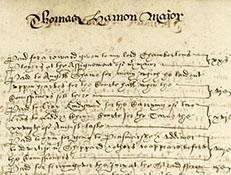Shakespeare Documented is still growing! Currently, two thirds of the descriptions and 98% of the images are available in the resource. Descriptive text will continue to be added, updated and expanded. Visit our About page to learn more about the project scope.
EXPLORE THE DOCUMENTS BY CATEGORY
SHAKESPEARE DOCUMENTED IS STILL GROWING
Descriptive content and transcriptions will continue to be added, updated and expanded. Check back for regular updates!
Filter the documents by tag(s)
November 15, 1597
Lay subsidies were a type of tax based on personal wealth. In London, the collection of subsidies was managed at the local level of ward and parish. Each collection typically generated one lay subsidy roll and one default roll for each ward.
May 2-9, 1597
In May 1597, the freehold title to New Place passed from William Underhill to William Shakespeare. This would normally have been recorded in a formal deed of conveyance, signed by both parties.
1597
Richard III was first printed in 1597, and the title page enumerates the various exploits to be found within, including Richard’s “treacherous Plots,” the “pittiefull murther of his innocent nephews,” his “tyrannicall vsurpation,” and of course h
1597
Romeo and Juliet was one of Shakespeare’s most popular plays from the moment it was first performed and printed.
ca. August 27, 1597
This document, part of the Rye Chamberlain’s Accounts, includes an August 1597 entry for a payment of 20 shillings to Shakespeare’s company, the Lord Chamberlain’s Men.
November 4, 1598
On October 25, 1598, Richard Quiney wrote both to Shakespeare, asking for his help in securing a loan of £30 and to his friend Abraham Sturley in Stratford-upon-Avon to let him know the request had been made.
1598
This edition of Henry IV Part 1 is the earliest printed version of the play to survive fully intact.
February 4, 1598
In this 1598 survey of those storing grain in Stratford-upon-Avon, “W[illia]m Shackesp[ear]e” is listed as holding 10 quarters of malt.
July 22, 1598
The Merchant of Venice was entered into Liber C of the Stationers' Company on July 22, 1598, under "the title the Marchaunt of Venyce or otherwise called the Jewe of Venyce." James Roberts, the London printer and publisher who entered the title, was allowed to enter the pla
ca. November 4, 1598
While in London in the autumn of 1598, Richard Quiney received five letters from his father Adrian. Four are dated (October 20 and 29, November 10 and 18).

